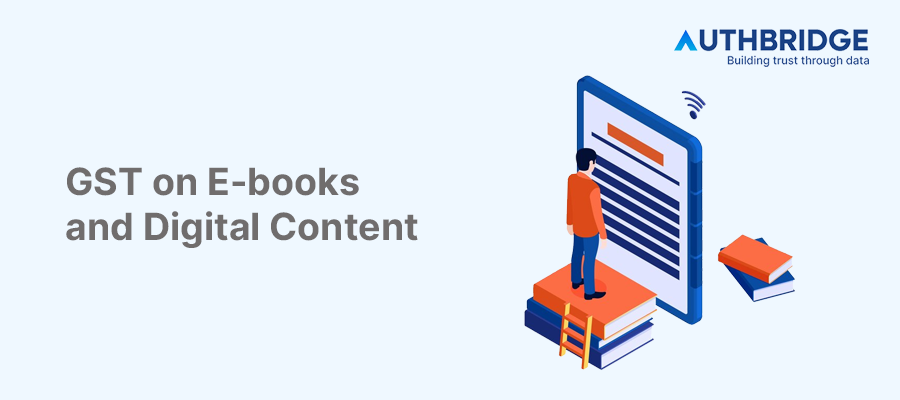A Clear Guide To GST On E-books & Digital Content In India

Introduction to GST on Digital Content
The Goods and Services Tax (GST) has transformed the taxation landscape for various sectors, including the digital content and e-book publishing industry. With the advent of digital technology, the consumption of content has significantly shifted towards electronic formats, necessitating a clear understanding of GST implications for these services.
Overview of GST on E-books and Digital Publications
GST on digital content, including e-books, online journals, and databases, is determined based on whether the content is considered a good or a service. The classification has direct implications on the applicable GST rates and compliance requirements.
Distinction Between E-books and Online Databases
E-books are typically considered as the digital equivalent of printed books, attracting similar GST rates as their physical counterparts. However, online databases and access to digital libraries are treated differently, often classified under services with distinct GST implications.
GST Rates for E-books and Digital Content
The GST framework categorizes e-books and digital content under various headings, influencing the tax rates applied to these products and services.
GST Rates for Printed Books and Their Digital Equivalents
Printed books enjoy a GST exemption or a lower tax rate, a benefit extended to e-books following specific notifications aimed at promoting digital literacy and reducing the cost of educational materials.
Impact of Notification No. 13/2018-C.T.(Rate) on E-books
This notification reduced the GST rate for e-books, aligning it with the rate for printed books, thereby supporting the e-publishing industry and making digital reading materials more accessible.
Classification of Digital Content Under GST
Understanding the classification of digital content under GST is crucial for determining the correct tax rate and compliance requirements.
E-books vs. Online Databases: GST Implications
While e-books might enjoy lower GST rates, online databases are often classified under services, attracting a standard GST rate. This distinction is crucial for publishers and content providers in strategizing their offerings.
Case Law: Supply of Access to Online Databases
Recent rulings have clarified that the supply of access to online databases cannot be equated to e-books, impacting the GST rates applicable and the eligibility for certain exemptions.
Input Tax Credit (ITC) for E-books and Digital Content Providers
ITC plays a significant role in the GST framework, allowing businesses to reduce their tax liability by claiming credit for the tax paid on inputs.
Eligibility for ITC on E-books and Related Digital Services
Digital content providers can avail ITC on inputs used in the production and distribution of e-books and online databases, subject to fulfilling specific conditions and compliance requirements.
Challenges in Availing ITC for Digital Content Providers
Despite the eligibility, many digital content providers face challenges in availing ITC due to complex compliance requirements and the need for meticulous record-keeping.
Compliance and Documentation for Digital Content Providers
Adhering to GST compliance requirements is essential for e-book publishers and digital content providers to avoid penalties and ensure smooth business operations.
GST Filing Requirements for E-book Publishers
E-book publishers must file regular GST returns, detailing their sales, purchases, and tax liabilities. Understanding the filing requirements is crucial for timely and accurate compliance.
Documentation and Record-Keeping Best Practices
Maintaining comprehensive records of transactions, tax invoices, and ITC claims is essential for meeting GST compliance requirements and facilitating audits.
Challenges and Solutions for GST on Digital Content
The digital content industry faces several GST-related challenges, ranging from classification issues to compliance complexities.
Addressing Common Compliance Issues
E-book publishers and digital content providers can address compliance issues by staying updated on GST regulations, leveraging technology for record-keeping, and seeking professional advice when needed.
Recommendations for E-book Publishers and Digital Content Providers
Adopting best practices in GST compliance, exploring eligibility for exemptions and concessions, and participating in industry forums can help digital content providers navigate the GST landscape effectively.
Future Outlook and Recommendations
The GST framework for digital content is evolving, with potential changes aimed at simplifying compliance and supporting the growth of the digital publishing industry.
Anticipated Changes in GST Policies for Digital Content
Stakeholders anticipate further clarifications and amendments to GST policies affecting digital content, aiming to address industry concerns and promote digital education and entertainment.
Enhancing the Digital Publishing Ecosystem Under GST
Recommendations for enhancing the digital publishing ecosystem include advocating for uniform GST rates for all forms of educational content, simplifying compliance procedures, and encouraging innovation in digital content delivery.
Category

Abhinandan Banerjee
(Associate Manager - Marketing)
Abhinandan is a dynamic Product and Content Marketer, boasting over seven years of experience in crafting impactful marketing strategies across diverse environments. Known for his strategic insights, he propels digital growth and boosts brand visibility by transforming complex ideas into compelling content that inspires action.



